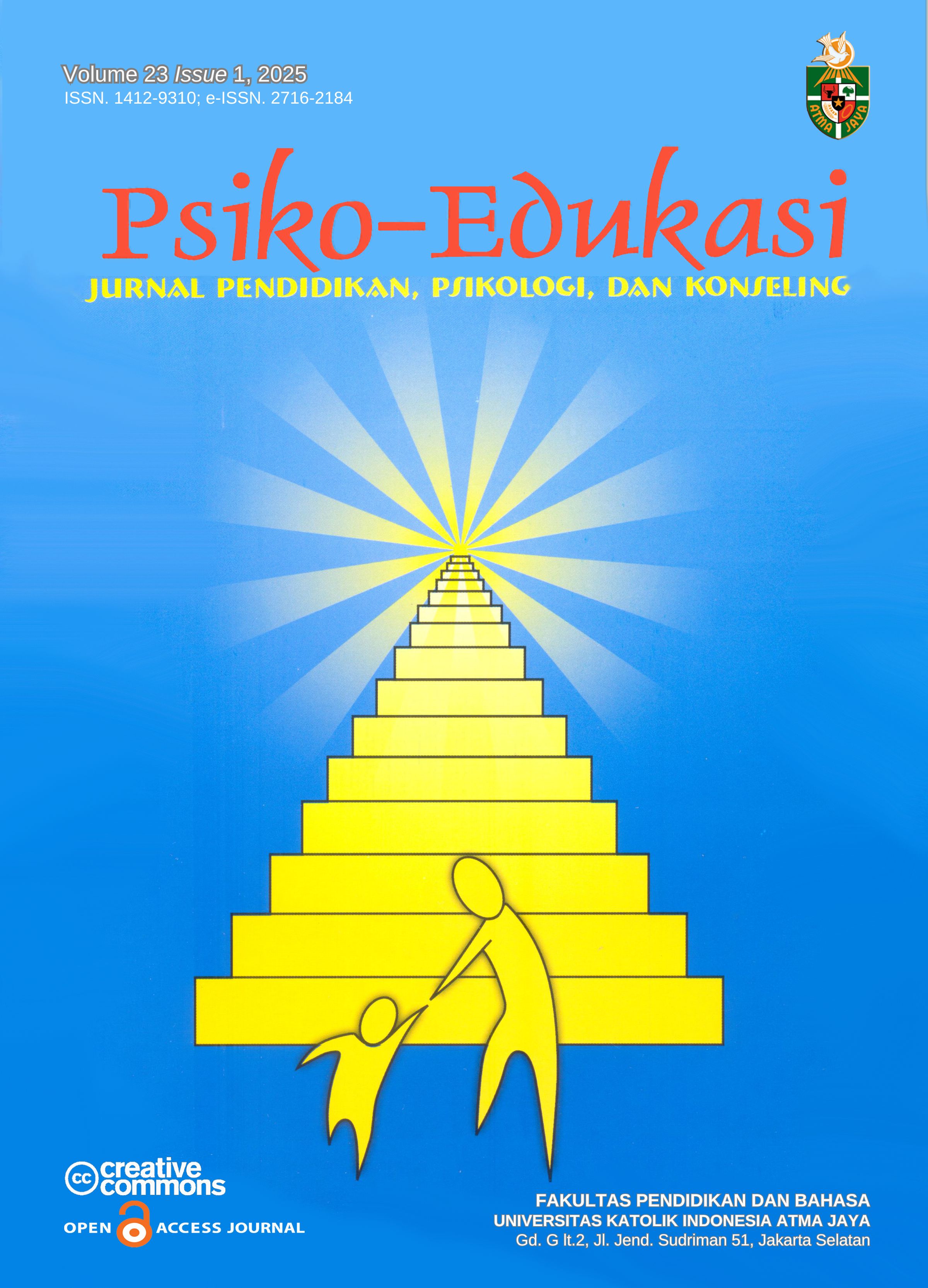DIFFERENTIATED LEARNING TO IMPROVE THE ACADEMIC DEVELOPMENT OF STUDENTS WITH SPECIAL NEEDS
DOI:
https://doi.org/10.25170/psikoedukasi.v23i1.6999Keywords:
differentiated learning, students with special needs, academic developmentAbstract
"Students with special needs" is a term used to describe students with disabilities or limitations, whether sensory, intellectual, physical, or social-emotional, that impact their growth and development, necessitating specialized educational support services. Students with special needs face various developmental challenges, such as establishing self-identity, strengthening social relationships, and developing independence and academic abilities. However, a uniform learning approach often fails to address diverse learning needs, resulting in suboptimal achievement of these developmental tasks. In the context of the Independent Curriculum (National Curriculum), differentiated learning is an adaptive and responsive solution to this diversity. This article discusses the implementation of differentiated learning as a strategy to support the achievement of developmental tasks in students with special needs, specifically to help enhance their cognitive development and develop academic competencies through effective learning. Based on theoretical studies and data from five recent empirical research findings, differentiated learning has been shown to improve learning outcomes, self-confidence, learning independence, active participation in project-based learning, and create a positive and inclusive classroom climate. Therefore, this strategy needs to be systematically integrated into learning practices to support the holistic growth and development of students with special needs.
References
Hallahan, D. P., & Kauffman, J. M. (2006). Exceptional Learners: Introduction to Special Education. Boston: Pearson Education.
Hurlock, E. B. (2020). Developmental Psychology: A Life-Span Approach. Jakarta: Erlangga.
Indrayani, R., Susanto, A., & Nurhadi, M. (2022). Implementasi Pembelajaran Berdiferensiasi dalam Kurikulum Merdeka. Jurnal Pendidikan Indonesia, 11(2), 105– 115.
Kemendikbudristek. (2022). Panduan Implementasi Kurikulum Merdeka. Jakarta: Kemdikbud.
Kirk, S. A., Gallagher, J. J., & Anastasiow, N. J. (2009). Educating Exceptional Children. Belmont, CA: Wadsworth.
Kusumawardani, D., & Puspitasari, E. (2023). Diferensiasi Pembelajaran sebagai Strategi Inklusif. Jurnal Inovasi Pendidikan, 8(1), 45–56.
Lestari, N., & Wibowo, A. (2023). Pengaruh Pembelajaran Berdiferensiasi terhadap Rasa Percaya Diri Siswa. Jurnal Psikologi Pendidikan, 7(3), 231–240.
Mulyono. (2011). Pendidikan Anak Berkebutuhan Khusus. Jakarta: PT Bumi Aksara.
Prasetyo, R., Utami, D., & Hamid, S. (2023). Kemandirian Belajar dalam Pembelajaran Berdiferensiasi. Jurnal Evaluasi Pendidikan, 6(2), 190–202.
Republik Indonesia. (2016). Undang-Undang Republik Indonesia Nomor 8 Tahun 2016 tentang Penyandang Disabilitas. Jakarta: Sekretariat Negara.
Santrock, J. W. (2019). Adolescence (16th ed.). New York: McGraw-Hill Education.
Sari, D. K., & Nugroho, B. (2021). Efektivitas Pembelajaran Berdiferensiasi dalam Proyek P5. Jurnal Kurikulum dan Pembelajaran, 10(4), 112–123.
Sunardi, et al. (2011). Pendidikan Inklusif. Jakarta: Direktorat Jenderal Pendidikan Tinggi, Kementerian Pendidikan Nasional.
Tomlinson, C. A. (2017). How to Differentiate Instruction in Academically Diverse Classrooms (3rd ed.). Alexandria, VA: ASCD.
Yuliani, L., & Setiawan, A. (2024). Iklim Belajar Positif melalui Diferensiasi Pembelajaran. Jurnal Pendidikan dan Inovasi, 9(1), 66–75.
Vygotsky, L. S. (1978). Mind in Society: The Development of Higher Psychological Processes. Cambridge: Harvard University Press.


















